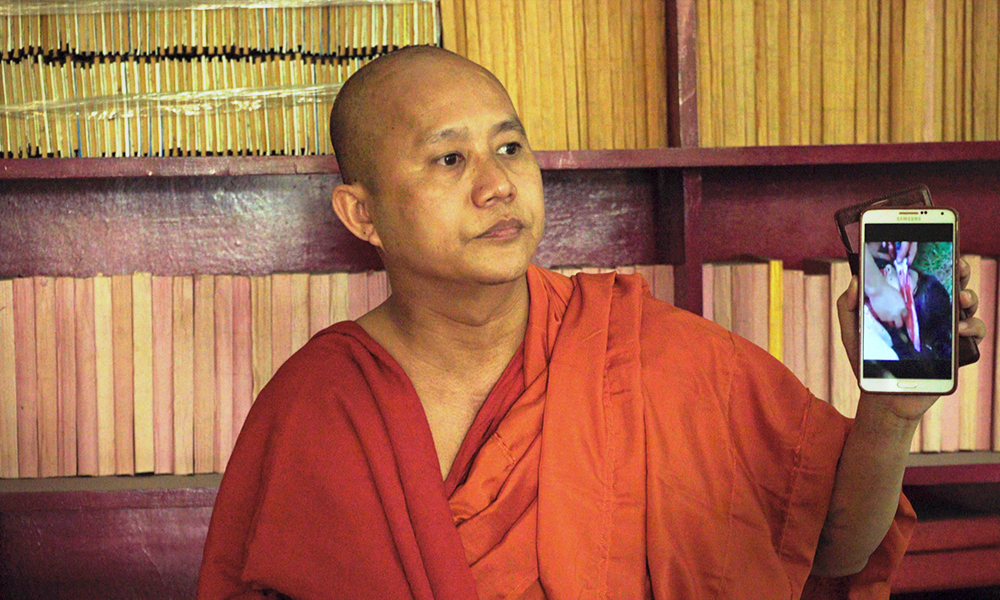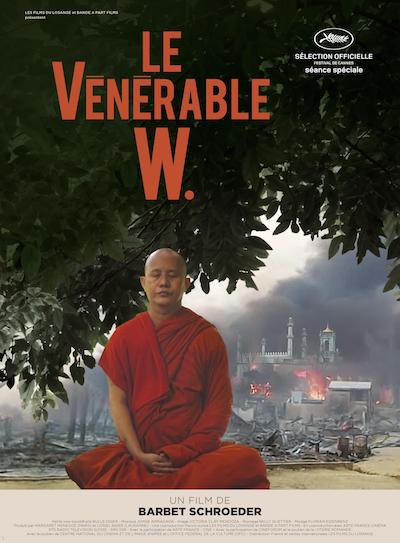Le Vénérable W (The Venerable W)

Barbet Schroeder completes his Trilogy of Evil with a sharp excoriation of Ashin Wirathu, The Venerable W of the title, a Buddhist monk from Myanmar with a penchant for loathsome demagoguery and a tendency to incite racial and religious violence. Wirathu has much in common with the dim, paranoid populists that seem to dominate discussion of contemporary European politics, and Schroeder gives this little despot more than enough rope to perversely justify his vicious vendetta against Muslims.
There is something visibly incongruous about these monks, barefoot and clad in orange togas, chanting in unison about the elimination of the Rohingya minority community. On the subject, this critic remembers catching BBC reports and has vague recollections of that famous TIME cover – “The Face of Buddhist Terror” – but the sustained focus of this documentary teases out the absurdities as well as the horror of their position. At one point, Wirathu proudly shows an amateur video recreating the murder of a young Buddhist girl by apparently feral Muslims. It is shockingly made, with a borderline hallucinogenic musical score. It seems like a strange adoption of Joshua Oppenheimer’s technique in The Act of Killing, which asked Indonesian militants to re-enact their crimes. Further, the monk’s obsession with his online popularity reflects a wider concern about extremists’ ability to manipulate social media and, as the film shows, directly incite followers to violence. Wirathu is evidently obsessed with power, and the inevitable question arises over the agency of his public pronouncements. Is he cynical or delusional? Predictably, the answer may fall in between. Wirathu draws strength from his seemingly well-attended public gatherings, espousing crude binary positions that elicit monosyllabic affirmations from the crowd. If he doesn’t believe his invective, he has an excellent poker face.
The work interviews opposing viewpoints: moderate Buddhists, western human rights journalists and a leader of the Rohingya community. Their contributions add little to what we can see already, and the scratchy footage of immolations, beatings and murder sufficiently outline the crimes being undertaken. The attempted eradication of a people indicates genocide, although the film wisely stops short of this claim. The end is unresolved because the current reality is unsatisfactory. More interrogation of leader Aung San Suu Kyi’s position would have been welcome, and narrator Bulle Ogier’s invocation of love at the end is simply not good enough. However, this is an urgent, important film.
Joseph Owen
Le Vénérable W (The Venerable W) does not have a UK release date yet.
Read more reviews and interviews from our London Film Festival 2017 coverage here.
For further information about the event visit the official BFI website here.
Watch the trailer for Le Vénérable W (The Venerable W) here:
























Facebook
Twitter
Instagram
YouTube
RSS